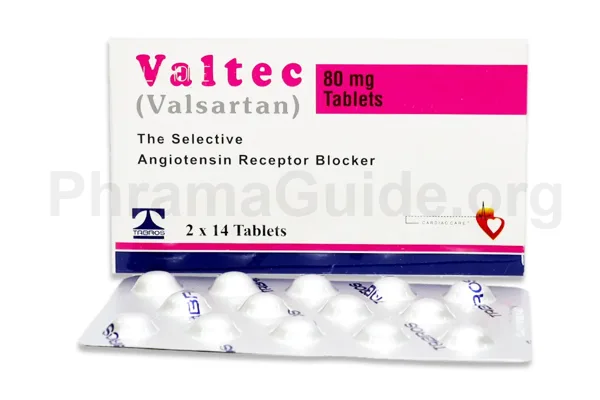Valtec is a medication commonly used to treat high blood pressure, and heart failure, and to improve survival after a heart attack. While it’s generally well-tolerated, like any medication, Valtec can cause side effects in some people. Some common and less common side effects of Valtec may include:
Common Side Effects
- Dizziness or lightheadedness: Some individuals may experience a feeling of dizziness or light-headedness, especially when standing up quickly from a sitting or lying position.
- Fatigue: Feeling tired or fatigued is a common side effect reported by some individuals taking Valtec.
- Headache: Headaches can occur, especially when starting the medication or with changes in dosage.
- Nausea and abdominal pain: Some people may experience stomach discomfort, nausea, or abdominal pain while taking Valtec.
- Back pain: Back pain might occur with Valtec as a side effect in some individuals.
- Upper respiratory infections: There have been reports of an increased risk of upper respiratory tract infections in some patients.
- Hyperkalemia (high potassium levels): Valtec can rarely lead to increased levels of potassium in the blood, which can cause symptoms such as weakness, irregular heartbeat, or numbness.
- Changes in kidney function: In rare cases, Valtec can affect kidney function, especially in people with pre-existing kidney issues.
- Allergic reactions: Some individuals may experience allergic reactions, characterized by symptoms like rash, itching, swelling, or trouble breathing.
Less Common Side Effects
- Hypotension (low blood pressure): Valtec can occasionally cause a drop in blood pressure, leading to symptoms like dizziness, fainting, or feeling light-headed.
- Chest pain: Some individuals may experience chest pain or tightness as a side effect of Valtec.
- Palpitations: Irregular heartbeat or palpitations can occur in rare cases.
- Increased levels of blood urea nitrogen (BUN) or creatinine: This can indicate a potential impact on kidney function, particularly in individuals with pre-existing kidney issues.
- Rash or skin reactions: Allergic reactions to Valtec can manifest as skin rashes, itching, or other skin irritations.
- Jaundice: In very rare instances, Valtec can affect the liver, leading to symptoms like yellowing of the skin or eyes (jaundice).
- Muscle cramps or weakness: Some people may experience muscle-related symptoms such as cramps or weakness.
- Pancreatitis: Although rare, Valtec has been associated with cases of pancreatitis, characterized by severe abdominal pain.
- Blood disorders: In extremely rare cases, Valtec might affect blood cell counts, leading to conditions like thrombocytopenia (low platelet count) or leukopenia (low white blood cell count).

What is Valtec?
Valtec is one of the leading brands of Valsartan, manufactured and marketed by Tabros Pharma Pakistan.
Valtec : Available Formulations and Strengths
Presently, Valtec is available in Tablet Form with the following strengths.
Valtec Tablets : 40mg, 80mg, and 160mg strengths.
What Are The Possible Drug Interactions of Valtec?
- Potassium supplements or potassium-sparing diuretics: Combining Valtec with potassium supplements or medications that retain potassium, like certain diuretics (e.g., spironolactone), can lead to increased potassium levels in the blood, potentially causing hyperkalemia.
- Lithium: Valtec may increase the levels of lithium in the blood, raising the risk of lithium toxicity. Monitoring lithium levels is crucial when used concomitantly with Valtec.
- Nonsteroidal anti-inflammatory drugs (NSAIDs): NSAIDs like ibuprofen or naproxen may reduce the blood pressure-lowering effects of Valtec and increase the risk of kidney problems. Long-term use of NSAIDs, especially in high doses, should be avoided or used cautiously with Valtec.
- Certain antihypertensive medications: Combining Valtec with other blood pressure-lowering medications (e.g., ACE inhibitors, beta-blockers, or calcium channel blockers) might enhance the blood pressure-lowering effects. However, this combination should be closely monitored by a healthcare provider to prevent excessive blood pressure reduction.
- Diuretics (water pills): When combined with Valtec, diuretics can further reduce blood pressure. However, excessive lowering of blood pressure might occur, requiring careful monitoring by a healthcare professional.
- Dual blockade of the renin-angiotensin-aldosterone system (RAAS): Concomitant use of Valtec with ACE inhibitors or aliskiren in patients with diabetes or kidney impairment should generally be avoided due to an increased risk of hypotension, hyperkalemia, and kidney problems.
- Certain medications metabolized by CYP2C9: Valtec has a minimal effect on the cytochrome P450 system, so interactions involving CYP2C9 substrates are unlikely. However, caution might be needed when using medications metabolized by this enzyme system.

Leave A Comment